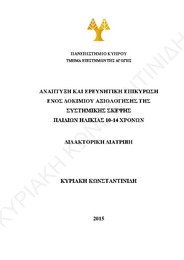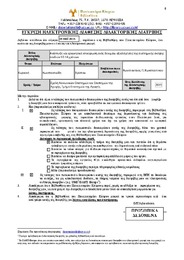| dc.contributor.advisor | Κωνσταντίνου, Κωνσταντίνος Π. | el |
| dc.contributor.author | Κωνσταντινίδη, Κυριακή Χ. | el |
| dc.coverage.spatial | Κύπρος | el |
| dc.coverage.spatial | Cyprus | en |
| dc.creator | Κωνσταντινίδη, Κυριακή Χ. | el |
| dc.date.accessioned | 2015-06-18T09:22:02Z | |
| dc.date.accessioned | 2017-08-03T09:39:44Z | |
| dc.date.available | 2015-06-18T09:22:02Z | |
| dc.date.available | 2017-08-03T09:39:44Z | |
| dc.date.issued | 2015-05 | |
| dc.date.submitted | 2015-05-19 | |
| dc.identifier.uri | https://gnosis.library.ucy.ac.cy/handle/7/39207 | en |
| dc.description | Περιέχει βιβλιογραφικές παραπομπές. | el |
| dc.description | Αριθμός δεδηλωμένων πηγών στη βιβλιογραφία: 190 | el |
| dc.description | Διατριβή (Διδακτορική) -- Πανεπιστήμιο Κύπρου, Σχολή Κοινωνικών Επιστημών και Επιστημών Αγωγής, Τμήμα Επιστημών της Αγωγής, 2015. | el |
| dc.description | Η βιβλιοθήκη διαθέτει αντίτυπο της διατριβής σε έντυπη μορφή. | el |
| dc.description.abstract | Η συστημική σκέψη είναι μια δεξιότητα σκέψης, η οποία επιτρέπει σε ένα άτομο να ορίσει ένα σύστημα μέσα από τα στοιχεία που το αποτελούν και τα αναδυόμενα φαινόμενά του, και να αναγνωρίσει αλληλεπιδράσεις και ροές που συμβαίνουν μέσα στο σύστημα. Εφόσον ο κόσμος μας αποτελείται από συστήματα και υποσυστήματα, η συστημική σκέψη είναι απαραίτητη δεξιότητα για την κατανόησή του, αλλά και για τη λήψη κατάλληλων αποφάσεων σε προβληματικές καταστάσεις.
H ανάπτυξη της συστημικής σκέψης μέσα από ειδικά σχεδιασμένα εκπαιδευτικά προγράμματα (ειδικά στο συγκείμενο των Φυσικών Επιστημών που βρίθει συστημάτων), αλλά και η ανάπτυξη επικυρωμένων οργάνων μέτρησης της αποτελεσματικότητας τέτοιων παρεμβατικών προγραμμάτων είναι εξαιρετικής σημασίας.
Η επιστημονική βιβλιογραφία έχει να παρουσιάσει μεγάλο αριθμό μεθοδικών προσπαθειών ανάπτυξης οργάνων μέτρησης γνώσεων, στάσεων και δεξιοτήτων. Ειδικά όμως για τη συστημική σκέψη, ελάχιστα έχουν γίνει προς αυτή την κατεύθυνση, ιδιαίτερα όσον αφορά παιδιά ηλικίας 10-14 χρόνων. Η παρούσα έρευνα στοχεύει στην ανάπτυξη ενός επικυρωμένου οργάνου μέτρησης της συστημικής σκέψης των παιδιών, ενός δοκιμίου πολλαπλής επιλογής, δίνοντας ιδιαίτερη έμφαση στη διαδικασία ανάπτυξής του.
Συγκεκριμένα, εισηγείται μια κυκλική και επαναλαμβανόμενη διαδικασία, κατά την οποία λαμβάνεται ανατροφοδότηση από όλους τους εμπλεκόμενους φορείς (βιβλιογραφία, ειδικούς στο θέμα, εκπαιδευτικούς, αλλά και ποιοτικά και ποσοτικά δεδομένα από τα παιδιά), η οποία οδηγεί κάθε φορά σε τροποποίηση του εννοιολογικού και λειτουργικού ορισμού της συστημικής σκέψης. Στο πρώτο στάδιο διατυπώθηκε ο σκοπός του Δοκιμίου Συστημικής Σκέψης (ΔοΣΣ) και στο δεύτερο στάδιο διατυπώθηκαν οι προδιαγραφές του. Στο τρίτο στάδιο, η ανάπτυξη του ορισμού της συστημικής σκέψης και των έργων για τη μέτρησή της έγινε μέσα από δύο κύκλους ανάπτυξης. Κάθε κύκλος περιελάμβανε διάφορες φάσεις ανάπτυξης (5 φάσεις για τον πρώτο και 6 φάσεις για τον δεύτερο κύκλο). Μετά από κάθε φάση, τα αποτελέσματα των ποιοτικών ή ποσοτικών αναλύσεων, μαζί με την ανασκόπηση της τρέχουσας βιβλιογραφίας, οδηγούσαν σε τροποποίηση των έργων του ΔοΣΣ, αλλά και, ενδεχομένως, στον ορισμό της συστημικής σκέψης. Με αυτό τον τρόπο, ενισχύθηκαν τα διάφορα είδη εγκυρότητας του δοκιμίου και η αξιοπιστία του. Στο τέταρτο στάδιο έγινε η συναρμολόγηση του δοκιμίου και ο έλεγχος της δομικής εγκυρότητας του μέσα από την Επιβεβαιωτική Παραγοντική Ανάλυση και ο έλεγχος της ποιότητας των έργων με παράλληλη παραγωγή ενιαίας κλίμακας έργων και υποκειμένων μέσα από αναλύσεις με βάση τις αρχές της Classical Test Theory (CTT) και το μοντέλο Rasch.
Τα αποτελέσματα της έρευνας επιβεβαιώσαν την προτεινόμενη δομή του εννοιολογικού ορισμού της συστημικής σκέψης, καθώς και την ικανότητα του ΔοΣΣ να μετρά τη συστημική σκέψη παιδιών ηλικίας 10-14 χρόνων.
Πέρα από τη μεθοδολογική της σημασία, η παρούσα έρευνα έχει και εκπαιδευτική σημασία, γιατί τα «προϊόντα» της, η δομή της συστημικής σκέψης και το ΔοΣΣ αναμένεται να αξιοποιηθούν, το πρώτο ως οδηγός για τη διατύπωση στόχων και δραστηριοτήτων για την ανάπτυξη παρεμβατικών προγραμμάτων προώθησης της συστημικής σκέψης, ενώ το δεύτερο ως εργαλείο αξιολόγησης της αποτελεσματικότητάς τους. | el |
| dc.description.abstract | Systems thinking is the thinking skill that allows someone to define a system through its essential components and its emergent phenomena, and to identify the interactions and flows that take place within the system. Since the world around us consists of systems and subsystems, systems thinking is essential, not only in understanding its structure and behavior, but also in decision making situations.
Promoting both, carefully designed curricula for the development of systems thinking (especially in the context of Physical Sciences that is replete with systems), and validated instruments to evaluate their efficiency is extremely important.
Scientific literature provides a great number of attempts to create validate instruments measuring knowledge, attitudes and skills. Nevertheless, little has been done in the direction of systems thinking, especially for children aged 10-14 years old. The present study aims at developing a validated instrument in the form of a multiple-choice test, for measuring children’s systems thinking, emphasizing the importance of methodology procedures followed in order to validate the instrument.
More specifically, it presents a cyclic and iterative procedure, during which all parts (literature, experts, qualitative and quantitative data collected from the students) contribute in continually modifying the conceptual and operational definition of systems thinking.
The development of the Systems Thinking Assessment (STA) was carried out in four stages. In the first stage, the aim of the STA was formulated and in the second stage its specifications were formulated. In the third stage, the development of the conceptual definition of systems thinking and the test’s items was conducted in two cycles of development. Each cycle consisted of several phases (5-6 for each cycle). At the end of each phase, the results of the quantitative or qualitative data, along with the current literature review, guided the modification of the items and occasionally the systems thinking definition. In this way, the validity and reliability of the test were supported. At the fourth and final stage of the STA development, the test was assembled and analyses were carried out to verify its construct validity through Confirmatory Factor Analysis and to assess the quality of the items and to produce a scale for both items and subjects through analysis based on Classical Test Theory (CTT) and Rasch model.
The results of the research confirmed both the suggested structure of the conceptual definition of systems thinking and the STA’ s ability to measure systems thinking of students aged 10-14 years old.
Besides its methodological value, the present study exhibits educational value, since its products, the suggested structure of systems thinking and the STA, can be used, the first one as a guide in formulating the aims and the activities of a systems thinking based curriculum, and the second as a tool for evaluating the effectiveness of such curricula. | en |
| dc.format.extent | xxii, 210, [250] p. : εικ. ; 30 εκ. + 1 CD-ROM | el |
| dc.language.iso | gre | en |
| dc.publisher | Πανεπιστήμιο Κύπρου, Σχολή Κοινωνικών Επιστημών και Επιστημών Αγωγής / University of Cyprus, Faculty of Social Sciences and Education | |
| dc.rights | info:eu-repo/semantics/openAccess | en |
| dc.rights | Open Access | en |
| dc.subject.lcsh | System theory Cyprus Case studies | en |
| dc.subject.lcsh | Educational tests and measurements Cyprus Case studies | en |
| dc.subject.lcsh | Teaching | en |
| dc.subject.lcsh | Learning, Psychology of Case studies | en |
| dc.subject.lcsh | Rasch models | en |
| dc.subject.lcsh | Education, Primary Cyprus | en |
| dc.title | Ανάπτυξη και ερευνητική επικύρωση ενός δοκιμίου αξιολόγησης της συστημικής σκέψης παιδιών ηλικίας 10-14 χρόνων | el |
| dc.title.alternative | Development and research validation of a systems thinking test for 10-14 year-old children | en |
| dc.type | info:eu-repo/semantics/doctoralThesis | en |
| dc.contributor.committeemember | Κωνσταντίνου, Κωνσταντίνος Π. | el |
| dc.contributor.committeemember | Ζαχαρία, Ζαχαρίας | el |
| dc.contributor.committeemember | Μιχαηλίδης, Μιχάλης | el |
| dc.contributor.committeemember | Κορφιάτης, Κωνσταντίνος | el |
| dc.contributor.committeemember | Κολιόπουλος, Δημήτρης | el |
| dc.contributor.committeemember | Constantinou, Constantinos P. | en |
| dc.contributor.committeemember | Zacharia, Zacharias | en |
| dc.contributor.committeemember | Michaelides, Michalis | en |
| dc.contributor.committeemember | Korfiatis, Constantinos | en |
| dc.contributor.committeemember | Koliopoulos, Dimitris | en |
| dc.contributor.department | Πανεπιστήμιο Κύπρου, Σχολή Κοινωνικών Επιστημών και Επιστημών Αγωγής, Τμήμα Επιστημών της Αγωγής | el |
| dc.contributor.department | University of Cyprus, Faculty of Social Sciences and Education, Department of Education | en |
| dc.subject.uncontrolledterm | ΑΞΙΟΛΟΓΗΣΗ | el |
| dc.subject.uncontrolledterm | ΣΥΣΤΗΜΙΚΗ ΣΚΕΨΗ | el |
| dc.subject.uncontrolledterm | ΕΠΙΚΥΡΩΣΗ | el |
| dc.subject.uncontrolledterm | ΕΡΓΑΛΕΙΟ ΜΕΤΡΗΣΗΣ | el |
| dc.subject.uncontrolledterm | ΔΟΚΙΜΙΟ | el |
| dc.subject.uncontrolledterm | ΠΑΙΔΙΑ | el |
| dc.subject.uncontrolledterm | ΠΡΩΤΟΒΑΘΜΙΑ ΕΚΠΑΙΔΕΥΣΗ | el |
| dc.subject.uncontrolledterm | ΔΕΥΤΕΡΟΒΑΘΜΙΑ ΕΚΠΑΙΔΕΥΣΗ | el |
| dc.subject.uncontrolledterm | ASSESSMENT | en |
| dc.subject.uncontrolledterm | SYSTEMS THINKING | en |
| dc.subject.uncontrolledterm | MEASUREMENT INSTRUMENT | en |
| dc.subject.uncontrolledterm | TEST | en |
| dc.subject.uncontrolledterm | VALIDATION | en |
| dc.subject.uncontrolledterm | CHILDREN | en |
| dc.subject.uncontrolledterm | PRIMARY EDUCATION | en |
| dc.subject.uncontrolledterm | SECONDARY EDUCATION | en |
| dc.identifier.lc | LB3056.C93K66 2015 | en |
| dc.author.faculty | Σχολή Κοινωνικών Επιστημών και Επιστημών Αγωγής / Faculty of Social Sciences and Education | |
| dc.author.department | Τμήμα Επιστημών της Αγωγής / Department of Education | |
| dc.type.uhtype | Doctoral Thesis | en |
| dc.rights.embargodate | 2016-11-19 | |
| dc.contributor.orcid | Κωνσταντίνου, Κωνσταντίνος Π. [0000-0003-3183-4131] | |


